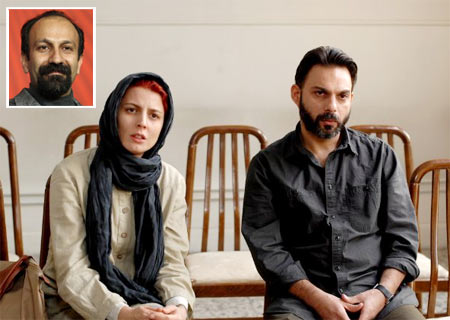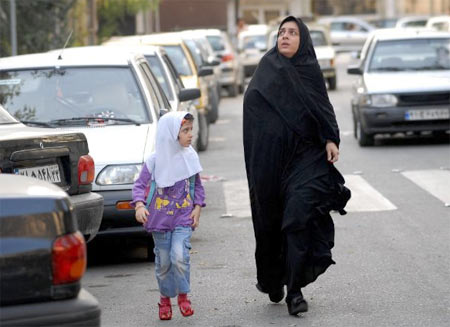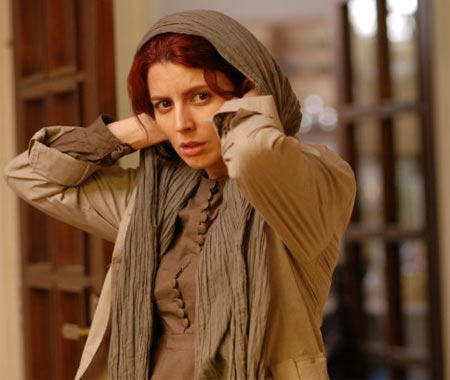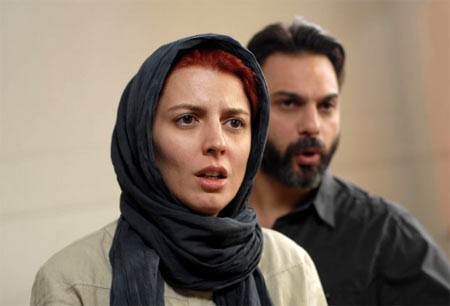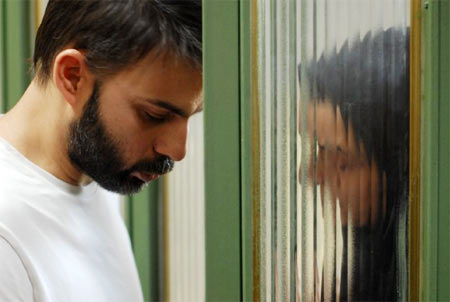 | « Back to article | Print this article |
'I don't have a main protagonist in my films'
Iranian filmmaker Asghar Farhadi brought his film Nadir and Simin: A Separation to the Berlin International Film Festival in February.
The 39-year-old Farhadi was well known at Berlin. Just two years before, he had won the Best Director Silver Bear for his last film About Elly.
Nader and Simin stunned everyone who saw it. Even Aamir Khan -- who was on the festival jury -- said it was the best film he had seen. On the last day of the festival, the film won the Golden Bear for Best Picture as well as two Silver Bears for its ensemble cast of male and female actors.
A Separation, as the film has been re-titled, is a stunning piece of filmmaking; an engaging, yet complex story about a marriage dissolving and an exploration of various layers of class, religious, legal and social issues in the contemporary Iranian society. It has been celebrated at many other festivals this year, and had already won a number of critic's awards in the US. Last week, the venerable Roger Ebert placed it on top of his list of the best films of 2011.
It won a Golden Globe nomination and is also Iran's official entry for the 2012 Oscar awards. The film opens in New York City on December 30.
Farhadi was in New York a couple of months ago for the film's presentation at the New York Film Festival. Aseem Chhabra spoke to Farhadi about the film and how he works with actors, and plots his script.
Why was the film's name changed after Berlin?
After Berlin, I thought that for the foreign market, it was better if it was just A Separation. In Iran, I have kept the original title.
If I had only used the word separation (judaai) in Persian, it would have had too much of a sentimental connotation. And I didn't want that sentimentality to be the part of the title. But the same conversation happened in Iran where people said 'You call it a separation of Nader and Simin, but it is a separation of so many other things.'
Incidentally, the names Nader and Simin mean something in Persian. Nader means rare and Simin means something very valuable, very precious like gold. It would therefore mean separating the precious from the rare.
'In all of my films there is a puzzle'
I think the script is so beautifully layered and so complicated. It's almost like a complex novel. How long did it take you to write it and how many versions did you do?
I had had this idea cooking in my head for a very long time, but it was four or five months of actually writing before I produced the first draft and then there were other drafts.
There were many elements that you hint at in the film, but never fully explain and I was wondering how much did you want to answer? Did you plan it and say 'I am going to leave that one, not answer that one?'
First of all, I want to make it clear that I do not hide things. It's just that I show less or I show without emphasizing. In all of my films there is a puzzle and I remove this one piece. In A Separation, the one piece is when the car hits the woman (Rezieh, the maid hired to take care of Nader's father who is suffering from Alzheimer's). I show you how she is about to cross the street. You even hear the car screeching and it's just one frame that you don't see.
In About Elly, the only piece that I removed when the girl got into the water and that is where the drama began. It's like in a thriller, somebody shoots a bullet and another person dies. If you miss that moment of who actually shot, then you have the drama. The more I progress, the more I chose the smallest piece of the puzzle. It may be the most insignificant, but it will still work.
'It's the story and the circumstances that make the characters'
You talk about the puzzle. Do you think about characters in the same way and who's your protagonist here?
I don't have a main protagonist. I don't understand what it means to have a main protagonist. I think it is a collective, a group of people within a certain set of circumstances. I don't separate my characters between the antagonist and the protagonist -- the good guys and the bad guys. I don't see them like that.
I don't start by creating characters. I start by creating a plot and I place the characters in the plot. Because of the circumstances of the plot they take on roles and positions. The same characters could appear in a few months in another set of circumstances and the story would be different. It's the story and the circumstances that make the characters.
The first scene in the film is very static, set in a court rom. But in the second scene, the characters come and go around the camera. Some speak, some don't, but somehow every character is introduced to us, just by their body language and how they are speaking. How did you plan that scene?
Movement is very important for me and I have a great deal of difficulty with scenes that don't have movement. I believe that through movement so much more can be communicated. I don't remember how I got to that scene initially, but I knew that after the opening scene where two people had been static, the next scene had to be very busy.
I felt that the chaotic relationship in the family could be well expressed through that motion. It looks like people are constantly trying to avoid one another, coming face-to-face with one another and hiding. There's even a moment when Simin goes into a closet and hides in the darkness of that.
'I never make a film that I cannot show inside Iran'
How do you work with your actors?
Before entering cinema, I worked in theatre. I learned how to make a relationship with my actors. I take a couple of months working with my actors. I never usually explain the characters and the script to the actors.
There is a religious character in the film. I never explained the role to her, but asked her to say her prayers everyday like a religious person. I asked her to wear a chador and walk around like that. It was very difficult for her since it was the first time she was wearing a chador. I asked her to stop using her expensive personal car, but to use the public transportation. She did these exercises for a few months and then she had turned into a religious person.
You cast your daughter Sarina in the role of Termeh -- Nader's and Simin's only child. How was it working with your daughter?
From one point of view, it was very easy and from another point of view, it was very difficult. When I was writing, because I knew she would perform the part, it helped me a lot because I knew what she was capable of doing. There were two difficulties when we actually started shooting -- one was that she didn't hold me in this position of authority (laughs).
I am the filmmaker so she was supposed to listen to me, but she kept asking, "Why, but why? Why this and why that?' I was concerned that since I was her father, I would take that and project that in the relationship between Nadir and his daughter and I would unconsciously favour Nadir in that situation, take Nadir's side as opposed to that of Simin.
'I actually have the audience find the faults and flaws in my characters'
The film has been released in Iran. How did you work that out?
I never make a film that I cannot show inside Iran. It is very important for me to have my film seen by my own people. And I always try to find a way for this. One of the ways is that I don't speak loudly in my films and I don't force my judgments on the audience. And there are other ways, but if I tell you then I can't use them anymore (laughs).
But how do you navigate and make films given censorship, the religious realities, your own beliefs and other complex aspects of the Iranian society?
I believe if you show the reality in an honest way, all of these angles are hidden in it. In the most simple stories that we tell to our children at bedtime, there are different angles and perspectives. You can highlight some of these angles with subtle references. In all the plays I wrote and films I have made, I tried not to categorise people as good or bad. Also I raise this issue in all my works: how can we categorise people as good and bad through law, society or religion. I actually have the audience find the faults and flaws in my characters.
I am curious about the stylistic choices you make, including lack of background score. There is very little music, just in the end of the film.
In my recent films, I have used very little music. This is not because I don't like music. On the contrary I have a lot of respect for music. When you like something too much, you use it very sparsely, very carefully. I believe music is an art itself, so I do not use it too much in service of another art.
Usually music is used to heighten the emotions for the audience, but I like to take the audience away from that state of mind and put them in a more thinking state. That is why I used the music in the end, essentially to take the pressure off from the audience.
